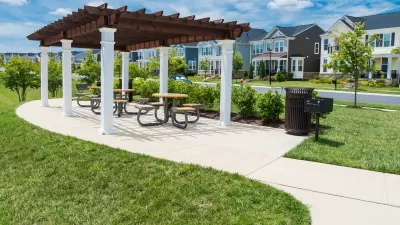Thirty community organizations have come together to deliver a response to Oakland's RFP for a comprehensive planning consultant. It's one of three proposals, but certainly the only one with cartoons.

Every Tuesday and Thursday, from 4 p.m. to 6:30 p.m., Nakia Woods has a meeting to help plan for the future of Oakland.
Woods is the program director at HOPE Collaborative — the acronym stands for “Health for Oakland’s People and Environment.” Those are the regular meeting times for the group’s Youth Action Board, which for the past ten years has brought together Oaklanders aged 14 to 24 from disinvested and marginalized neighborhoods across the Bay Area city.
“Houseless folks, queer folks, folks of color, young people, folks that are differently abled, there’s this misconception that these folks don’t really care about the general plan or city planning process,” says Woods.
Woods recently witnessed Youth Action Board members and other marginalized groups coming together around planning for the future of their neighborhoods. HOPE Collaborative was one of 12 community-based organizations who partnered with the city to lead the East Oakland Neighborhoods Initiative.
From November 2018 to June 2019, the East Oakland Neighborhoods Initiative organized a series of 20 meetings in six neighborhoods across what’s known as “Deep East Oakland” — all historically working-class, predominantly Black and brown neighborhoods that have born the brunt of earlier city planning decisions that have kept them in the path of toxic fumes, water contamination and other pollution. The results were a laundry list of 89 projects and policies residents would like to see funded and implemented, as well as closer connections between all 12 participating organizations.
Oakland now has a once-in-a-generation opportunity to call upon networks and conversations like those, all across the city and not just in Deep East Oakland, as the Oakland planning bureau begins the process of updating the city’s General Plan. It’s a document that guides city zoning and land use decisions and capital investments for the next few decades. The general plan determines what can be built where, shaping almost every aspect of a city’s built environment. Oakland’s current general plan was adopted back in 1998, though parts of it were updated in 2013.
HOPE Collaborative and more than 30 other Oakland community-based groups joined forces to submit “The Oakland People’s Plan,” a joint proposal in response to the city’s RFP in search of an outside consulting group to lead the General Plan update process. The collective, cobbled together in just a few weeks, was one of three finalists to deliver a detailed presentation to city planning staff in July. It’s almost certainly the only one with cartoons.
“Honestly it was a little bit overwhelming, learning about what the general plan is, learning about the possibilities of what could happen, learning about the implications of a general plan that is not equitable,” says Woods. “But business as usual has not worked for us. Business as usual really to me means non-authentic engagement or engagement only with people who are already at the table and involved with city processes and don’t understand the complexities that Oakland residents face, don’t understand racial equity, don’t understand gentrification and having to move out of a city some have called home for generations.”
FULL STORY: Comprehensive Planning Sucks. These Oaklanders Want to Make It Better.

Maui's Vacation Rental Debate Turns Ugly
Verbal attacks, misinformation campaigns and fistfights plague a high-stakes debate to convert thousands of vacation rentals into long-term housing.

Planetizen Federal Action Tracker
A weekly monitor of how Trump’s orders and actions are impacting planners and planning in America.

In Urban Planning, AI Prompting Could be the New Design Thinking
Creativity has long been key to great urban design. What if we see AI as our new creative partner?

King County Supportive Housing Program Offers Hope for Unhoused Residents
The county is taking a ‘Housing First’ approach that prioritizes getting people into housing, then offering wraparound supportive services.

Researchers Use AI to Get Clearer Picture of US Housing
Analysts are using artificial intelligence to supercharge their research by allowing them to comb through data faster. Though these AI tools can be error prone, they save time and housing researchers are optimistic about the future.

Making Shared Micromobility More Inclusive
Cities and shared mobility system operators can do more to include people with disabilities in planning and operations, per a new report.
Urban Design for Planners 1: Software Tools
This six-course series explores essential urban design concepts using open source software and equips planners with the tools they need to participate fully in the urban design process.
Planning for Universal Design
Learn the tools for implementing Universal Design in planning regulations.
planning NEXT
Appalachian Highlands Housing Partners
Mpact (founded as Rail~Volution)
City of Camden Redevelopment Agency
City of Astoria
City of Portland
City of Laramie





























